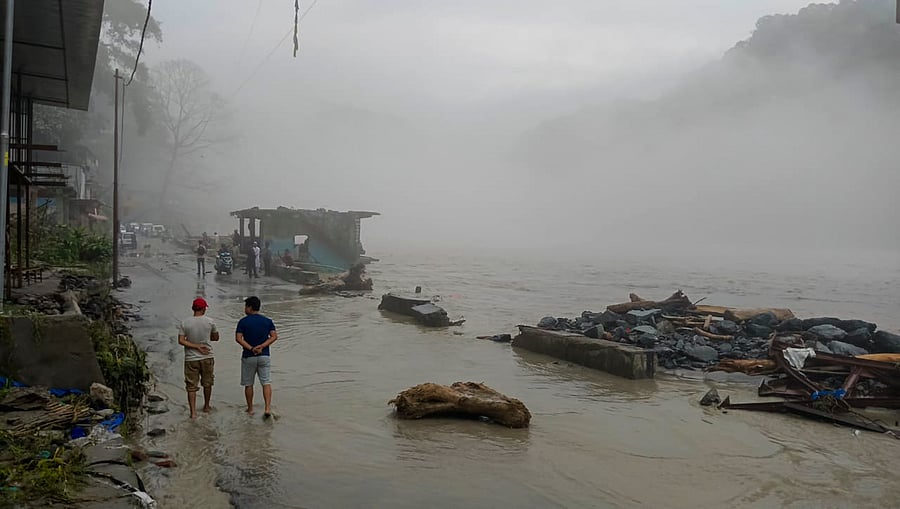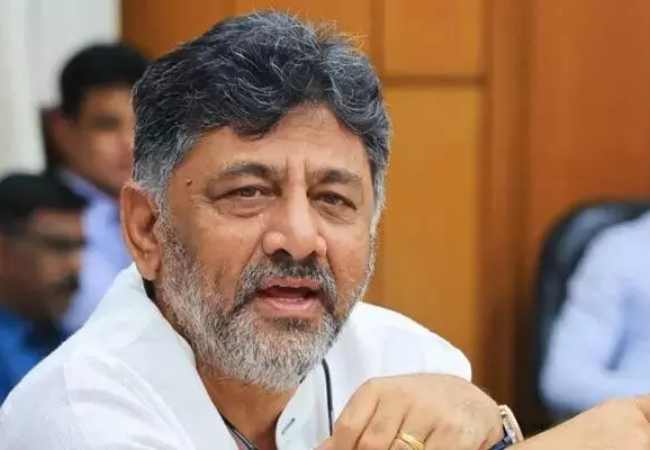Gangtok (PTI): Nearly 1,500 tourists were stranded in various parts of north Sikkim on Saturday as the main road was blocked due to landslides triggered by incessant rains, officials said.
On the other side, the search for the missing eight tourists was disrupted by heavy rains, and it was finally suspended after the water level in the Teesta river increased, they said.
One person was killed, two injured, and eight others went missing when a vehicle in which 11 tourists were travelling plunged into the Teesta river in Mangan district on Thursday night. The vehicle plunged more than 1,000 feet into the river near Munsithang along the Lachen-Lachung highway.
Mangan's SP Sonam Detchu Bhutia said 115 tourists are stranded in Lachen and 1,350 tourists in Lachung.
"Since exit from both directions is closed due to landslides at multiple locations, the tourists have been advised to remain in their hotels, and once the roads are completely opened, they shall be shifted," he said.
Incessant rainfall lashed the district throughout the day, especially the Chungthang sub-division, officials said
Power supply, which was snapped on Friday afternoon, was restored this evening, while efforts are underway to restore the drinking water supply by Sunday, they said.
The mobile connectivity was restored after nearly 24 hours, around 3 pm, they said.
Due to heavy rainfall induced by cloud burst in the area, the water level in the river Teesta has increased, they added.
The Lachung road was restored this evening, but the road from Pegong (Chungthang) to Phidang via Shipgyer, Sangkalang is closed due to multiple landslides, an official said.
"No tourist permits have been issued today, and will also not be issued tomorrow for visiting north Sikkim," he said.
Mangan's District Collector Anant Jain said he is stationed at the site where the tourist vehicle plunged into the Teesta and is overseeing the rescue efforts.
The SP said, "A continuous heavy rainfall and a swollen Teesta river have hampered the search to locate the eight missing persons. The search will resume as soon as weather conditions improve."
He said four identity cards and six mobile phones have been recovered by the search team from the river banks near the accident site.
Of the 11 persons on the ill-fated vehicle, two were identified as Swayam Supratim Nayak and Sairaj Jena, both from Odisha. They were rescued on the night of the accident and are undergoing treatment at the STNM Hospital in Gangtok.
"Search is still on for the remaining eight persons, which includes the driver of the vehicle, while one person was found dead," the SP said.
Of the eight missing tourists, four are from Odisha and two each from Tripura and Uttar Pradesh, he said.
They were Ajit Kumar Nayak, Sunita Nayak, Sahil Jena and Itshiri Jena from Odisha, Debjyoti Joy Dev and Swapnanil Deb from Tripura, and Kaushalendra Pratap Singh and Ankita Singh from Uttar Pradesh, he added.
The driver was identified as Passang Denu Sherpa of Singhik in North Sikkim.
Let the Truth be known. If you read VB and like VB, please be a VB Supporter and Help us deliver the Truth to one and all.
Bengaluru (PTI): Karnataka has proposed a new Information Technology Policy for 2025–2030, offering extensive financial and non-financial incentives aimed at accelerating investments, strengthening innovation and expanding the state's tech footprint beyond Bengaluru.
The Karnataka Cabinet gave its nod to the policy 2025–2030 with an outlay of Rs 445.50 crore on Thursday after the Finance Department accorded its approval.
The policy introduces 16 incentives across five enabler categories, nine of which are entirely new, with a distinctive push to support companies setting up or expanding in emerging cities.
Alongside financial support, the government is also offering labour-law relaxations, round-the-clock operational permissions and industry-ready human capital programmes to make Karnataka a globally competitive 'AI-native' destination.
According to the policy, units located outside Bengaluru will gain access to a wide suite of benefits, including research and development and IP creation incentives, internship reimbursements, talent relocation support and recruitment assistance.
The benefits also include EPF reimbursement, faculty development support, rental assistance, certification subsidies, electricity tariff rebates, property tax reimbursement, telecom infrastructure support, and assistance for events and conferences.
Bengaluru Urban will receive a focused set of six research and development and talent-oriented incentives, while Indian Global Capability Centres (GCCs) operating in the state will be brought under the incentive net.
Incentive caps and eligibility thresholds have been raised, and the policy prioritises growth-focused investments for both new and expanding units.
Beyond incentives, the government focuses on infrastructure and innovation interventions.
A flagship proposal in the policy is the creation of Techniverse -- integrated, technology-enabled enclaves developed through a public-private partnership model inside future Global Innovation Districts.
These campuses will offer plug-and-play facilities, artificial intelligence and machine learning and cybersecurity labs, advanced testbeds, experience centres, and disaster-resistant command centres.
There will also be a Statewide Digital Hub Grid and a Global Test Bed Infrastructure Network, linking public and private research and development, and innovation facilities across Karnataka.
The government has proposed a Women Global Tech Missions Fellowship for 1,000 mid-career women technologists, an IT Talent Return Programme to absorb experienced professionals returning from abroad, and broad-based skill and faculty development reimbursements.
Shared corporate transport routes in Bengaluru and tier-two cities will be designed with Bengaluru Metropolitan Transport Corporation and other transport entities to support worker mobility.
The government said the policy is the outcome of an extensive research and consultation process involving TCS, Infosys, Wipro, IBM, HCL, Tech Mahindra, Cognizant, HP, Google, Accenture and NASSCOM, along with sector experts and stakeholder groups.
It estimates an outlay of Rs 967.12 crore over five years, comprising Rs 754.62 crore for incentives and Rs 212.50 crore for interventions such as Techniverse campuses, digital grid development, global outreach missions and talent programmes.





